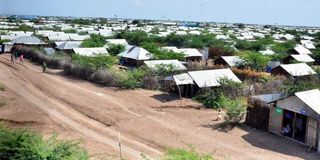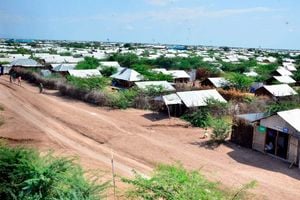
An aerial view of Kakuma 1 Refugee Camp located on the Kenya-Somalia border.
June 20, 2024 was just a normal day at Kakuma Refugee Camp and Kalobeyei Integrated Settlement in Turkana West Sub-County, before a disagreement over a scarf between boys from Nuer community of South Sudan and Anuak of Ethiopia flared up a long-simmering conflict between the two ethnic groups.
In total disregard to existing local conflict resolution and security structures, the altercation reignited the animosity between the Nuer and Anuak communities, resulting in deaths, injuries, displacement and destruction of houses.
In the end, Kakuma Refugee Camp Manager Edwin Chabari confirmed that at least four people were killed, 44 people injured and many forced to flee and seek refuge in churches and police stations, while others travelled to Ruiru in Kiambu County.
Nation established that Anuak also known as Anywaa, an agro-pastoralist group living in Gambella, located west of Ethiopia and the Nuer, a pastoral community who primarily live in South Sudan, but have found much of their population fleeing to Gambella as refugees ever since the 2013 South Sudan’s civil war, have been embroiled in such deadly conflict fueled by competition for resources, political marginalisation and the influx of armed refugees from South Sudan.
This is among the reasons why the animosity didn't only see the nearby Nuer ethnic group members around Kalobeyei solely engage their rivals, but called for a backup from Kakuma Refugee Camp-more than 20 kilometres away.
Daadab Camp
Asked why they fled to Ruiru, Ethiopia refugees said their neighbours, though they share the same culture and language-want to eliminate them from the camp.
"We should be taken back to Daadab Camp, far away from them," Ms Achan Goch, who was among those who travelled to Ruiru from the camp said.
She said despite security authorities being strict on ensuring that the camp is free from illegal firearms, the merciless killers stone some of their targets from a distance.
The major gaps cited for the deadly clashes are limited security presence, changing nature of the conflicts and influence from Europe and countries of origin through social media.
Mr Ayzack Obuya an Ethiopian refugee from Anuak community, confirmed that when a teacher identified as Olima Nyikuyi was killed, one of the attackers dropped a smartphone.
"We found text messages that revealed a coordinated and funded attack on members of the Anuak community from Ethiopia's Gambella region. We took the phone to Directorate of Criminal Investigations at Kakuma," Mr Obuya said.
A non-profit organisation- Anywaa Survival Organisation Director Nyikaw Ochalla said the latest 'barbaric assault' led to a severe humanitarian crisis where many refugees were displaced, many physically injured, houses destroyed and property looted.
"The immediate aftermath of this violence saw terrified and traumatised women and children travel long distances to Ruiru, in a desperate search for safety. As the refugees are returned to Kakuma from Ruiru, it will just expose them to more uncertainties, insecurity and humanitarian crisis," Mr Ochalla said.
Those who resisted plans to board the 11 buses and be taken back to Kakuma were met with physical abuses by security personnel, with some women separated from their children in the process.
"The involuntary return of Anuak refugees to Kakuma to a location devoid of shelter, food and essential items risk their health and safety. The Anuak people having survived the Ethiopia genocide in 2003 where they were targeted in their traditional homeland in Gambella by military in uniform, are yet facing another episode of persecution and neglect," he said.
Adequate protection
He called for a concerted effort to provide adequate protection and support to ensure that refugees are not subjected to further harm and their rights and dignity are preserved as per the international humanitarian principles.
Commissioner for Refugee Affairs John Burugu in a statement confirmed that as of July 4, 762 households comprising 3,054 individuals had travelled from Kakuma to Kiambu.
"Together with UNHCR and other partners, Department of Refugee Services (DRS) has held peace restoration meetings with the affected refugee communities, culminating in a peace agreement that allows for the reintegration of refugees back into the camp," Mr Burugu said.
"The government is working closely with humanitarian partners to ensure immediate needs of the refugees are met. Thereafter the DRS and UNHCR will conduct a verification of the refugees registration status before relocation back into the camp," he said.
DRS however reminded all refugees and asylum seekers of their obligation to respect the laws of Kenya, maintain peace and follow correct channels to communicate whenever they have grievances.
According to Kakuma Refugee Camp manager Edwin Chabari, Turkana County Security Committee team led by County Commissioner Julius Kavita deployed more security personnel in the camp for enhanced security patrols as well as weeding out the perpetrators of violence.
He said the conflict could not have escalated had representatives from Ethiopian Anuak community and South Sudanese Nuer tribe capitalised on peace resolution structures at zones and block level.
Kakuma Refugee Camp and adjacent Kalobeyei Integrated Settlement in Turkana West Sub County are currently home to more 257,498 asylum seekers and refugees from more than 15 countries.






